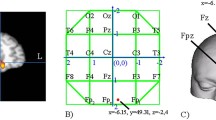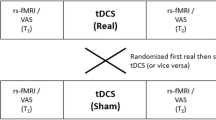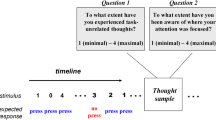Abstract
Mind-wandering is a cognitive process in which people spontaneously have thoughts that are unrelated to their current activities. The types of mind-wandering thoughts that people have when affected by a negative mood resemble thoughts associated with mood disorders (e.g., negative thoughts about the past). Transcranial direct current stimulation (tDCS) is a form of noninvasive brain stimulation that can modulate cognition and affect in healthy and clinical populations. Ninety participants received either excitatory, inhibitory, or sham tDCS to bilateral inferior parietal lobe nodes of the default mode network (DMN) to assess changes in maladaptive mind-wandering following criticism. tDCS did not change mind-wandering frequency after hearing criticism, but it did change what people mind-wandered about. Specifically, cathodal stimulation decreased the frequency of negative mind-wandering thoughts about the past. Future studies could investigate tDCS of DMN regions as an intervention for patients with mood disorders who suffer from negative, past-oriented cognitions.



Similar content being viewed by others
References
Andrews-Hanna, J. R., Reidler, J. S., Huang, C., & Buckner, R. L. (2010a). Evidence for the default network’s role in spontaneous cognition. Journal of Neurophysiology,104(1), 322–335. https://doi.org/10.1152/jn.00830.2009.
Andrews-Hanna, J. R., Reidler, J. S., Sepulcre, J., Poulin, R., & Buckner, R. L. (2010b). Functional-anatomic fractionation of the brain’s default network. Neuron,65(4), 550–562. https://doi.org/10.1016/j.neuron.2010.02.005.
Andrews-Hanna, J. R., Smallwood, J., & Spreng, R. N. (2014). The default network and self-generated thought: Component processes, dynamic control, and clinical relevance. Annals of the New York Academy of Sciences,1316, 29–52. https://doi.org/10.1111/nyas.12360.
Antal, A., Alekseichuk, I., Bikson, M., Brockmoller, J., Brunoni, A. R., Chen, R., et al. (2017). Low intensity transcranial electric stimulation: Safety, ethical, legal regulatory and application guidelines. Clinical Neurophysiology,128(9), 1774–1809. https://doi.org/10.1016/j.clinph.2017.06.001.
Antrobus, J. S. (1968). Information theory and stimulus-independent thought. British Journal of Psychology,59(4), 423–430.
Antrobus, J. S., Singer, J. L., Goldstein, S., & Fortgang, M. (1970). Mindwandering and cognitive structure. Transactions of the New York Academy Sciences,32(2), 242–252.
Antrobus, J. S., Singer, J. L., & Greenberg, S. (1966). Studies in the stream of consciousness: Experimental enhancement and suppression of spontaneous cognitive processes. Perceptual and Motor Skills,23(2), 399–417.
Axelrod, V., Rees, G., Lavidor, M., & Bar, M. (2015). Increasing propensity to mind-wander with transcranial direct current stimulation. Proceedings of the National Academy of Sciences,112(11), 3314–3319. https://doi.org/10.1073/pnas.1421435112.
Axelrod, V., Zhu, X., & Qiu, J. (2018). Transcranial stimulation of the frontal lobes increases propensity of mind-wandering without changing meta-awareness. Scientific Reports,8(1), 15975. https://doi.org/10.1038/s41598-018-34098-z.
Beck, A. T. (1967). Depression: Clinical, experimental, and theoretical aspects. New York: Harper & Row.
Beck, A. T. (1970). Cognitive therapy: Nature and relation to behavior therapy. Behavior Therapy,1(2), 184–200. https://doi.org/10.1016/S0005-7894(70)80030-2.
Bertossi, E., Peccenini, L., Solmi, A., Avenanti, A., & Ciaramelli, E. (2017). Transcranial direct current stimulation of the medial prefrontal cortex dampens mind-wandering in men. Scientific Reports,7(1), 16962. https://doi.org/10.1038/s41598-017-17267-4.
Bikson, M., Grossman, P., Thomas, C., Zannou, A. L., Jiang, J., Adnan, T., et al. (2016). Safety of transcranial direct current stimulation: Evidence based update 2016. Brain Stimulation,9(5), 641–661. https://doi.org/10.1016/j.brs.2016.06.004.
Borckardt, J. J., Bikson, M., Frohman, H., Reeves, S. T., Datta, A., Bansal, V., et al. (2012). A pilot study of the tolerability and effects of high-definition transcranial direct current stimulation (HD-tDCS) on pain perception. The Journal of Pain,13(2), 112–120. https://doi.org/10.1016/j.jpain.2011.07.001.
Buckner, R. L., Andrews-Hanna, J. R., & Schacter, D. L. (2008). The brain’s default network: Anatomy, function, and relevance to disease. Annals of the New York Academy of Sciences,1124, 1–38. https://doi.org/10.1196/annals.1440.011.
Buckner, R. L., & Carroll, D. C. (2007). Self-projection and the brain. Trends in Cognitive Sciences,11(2), 49–57. https://doi.org/10.1016/j.tics.2006.11.004.
Bush, G., Shin, L. M., Holmes, J., Rosen, B. R., & Vogt, B. A. (2003). The multi-source interference task: Validation study with fMRI in individual subjects. Molecular Psychiatry,8, 60. https://doi.org/10.1038/sj.mp.4001217.
Butler, A. C., Chapman, J. E., Forman, E. M., & Beck, A. T. (2006). The empirical status of cognitive-behavioral therapy: A review of meta-analyses. Clinical Psychology Review,26(1), 17–31. https://doi.org/10.1016/j.cpr.2005.07.003.
Cabeza, R., & St Jacques, P. (2007). Functional neuroimaging of autobiographical memory. Trends in Cognitive Sciences,11(5), 219–227. https://doi.org/10.1016/j.tics.2007.02.005.
Christoff, K., Gordon, A. M., Smallwood, J., Smith, R., & Schooler, J. W. (2009). Experience sampling during fMRI reveals default network and executive system contributions to mind wandering. Proceedings of the National Academy of Sciences USA,106(21), 8719–8724. https://doi.org/10.1073/pnas.0900234106.
Edwards, D., Cortes, M., Datta, A., Minhas, P., Wassermann, E. M., & Bikson, M. (2013). Physiological and modeling evidence for focal transcranial electrical brain stimulation in humans: A basis for high-definition tDCS. Neuroimage,74, 266–275. https://doi.org/10.1016/j.neuroimage.2013.01.042.
Eldaief, M. C., Halko, M. A., Buckner, R. L., & Pascual-Leone, A. (2011). Transcranial magnetic stimulation modulates the brain’s intrinsic activity in a frequency-dependent manner. Proceedings of the National Academy of Sciences USA,108(52), 21229–21234. https://doi.org/10.1073/pnas.1113103109.
Epel, E. S., Puterman, E., Lin, J., Blackburn, E., Lazaro, A., & Mendes, W. B. (2013). Wandering minds and aging cells. Clinical Psychological Science,1, 75–83.
Fox, M. D., Snyder, A. Z., Vincent, J. L., Corbetta, M., Van Essen, D. C., & Raichle, M. E. (2005). The human brain is intrinsically organized into dynamic, anticorrelated functional networks. Proceedings of the National Academy of Sciences USA,102(27), 9673–9678. https://doi.org/10.1073/pnas.0504136102.
Frank, E., Prien, R. F., Jarrett, R. B., Keller, M. B., Kupfer, D. J., Lavori, P. W., … Weissman, M. M. (1991). Conceptualization and rationale for consensus definitions of terms in major depressive disorder. Remission, recovery, relapse, and recurrence. Archives of General Psychiatry, 48(9), 851–855.
Fregni, F., Boggio, P. S., Santos, M. C., Lima, M., Vieira, A. L., Rigonatti, S. P., et al. (2006). Noninvasive cortical stimulation with transcranial direct current stimulation in Parkinson’s disease. Movement Disorders,21(10), 1693–1702. https://doi.org/10.1002/mds.21012.
Gbadeyan, O., Steinhauser, M., McMahon, K., & Meinzer, M. (2016). Safety, tolerability, blinding efficacy and behavioural effects of a novel MRI-compatible, high-definition tDCS set-up. Brain Stimulation,9(4), 545–552. https://doi.org/10.1016/j.brs.2016.03.018.
Hayes, S. C., Strosahl, K., & Wilson, K. G. (1999). Acceptance and commitment therapy: An experiential approach to behavior change. New York: Guilford Press.
Hofmann, S. G., Asnaani, A., Vonk, I. J. J., Sawyer, A. T., & Fang, A. (2012). The efficacy of cognitive behavioral therapy: A review of meta-analyses. Cognitive Therapy and Research,36(5), 427–440. https://doi.org/10.1007/s10608-012-9476-1.
Hofmann, S. G., Sawyer, A. T., Witt, A. A., & Oh, D. (2010). The effect of mindfulness-based therapy on anxiety and depression: A meta-analytic review. Journal of Consulting and Clinical Psychology,78(2), 169–183. https://doi.org/10.1037/a0018555.
Hooley, J. M., Gruber, S. A., Parker, H. A., Guillaumot, J., Rogowska, J., & Yurgelun-Todd, D. A. (2009). Cortico-limbic response to personally challenging emotional stimuli after complete recovery from depression. Psychiatry Research,172(1), 83–91.
Hooley, J. M., Gruber, S. A., Parker, H. A., Guillaumot, J., Rogowska, J., & Yurgelun-Todd, D. A. (2010). Neural processing of emotional overinvolvement in borderline personality disorder. Journal of Clinical Psychiatry,71(8), 1017–1024. https://doi.org/10.4088/JCP.07m03465blu.
Hooley, J. M., Gruber, S. A., Scott, L. A., Hiller, J. B., & Yurgelun-Todd, D. A. (2005). Activation in dorsolateral prefrontal cortex in response to maternal criticism and praise in recovered depressed and healthy control participants. Biological Psychiatry,57(7), 809–812. https://doi.org/10.1016/j.biopsych.2005.01.012.
Huba, G. J., Aneshensel, C. S., & Singer, J. L. (1981). Development of scales for three second-order factors of inner experience. Multivariate Behavioral Research,16(2), 181–206. https://doi.org/10.1207/s15327906mbr1602_4.
Jacobson, L., Koslowsky, M., & Lavidor, M. (2012). tDCS polarity effects in motor and cognitive domains: A meta-analytical review. Experimental Brain Research,216(1), 1–10. https://doi.org/10.1007/s00221-011-2891-9.
James, W. (1890). The stream of consciousness. In Principles of psychology (Vol. 1, pp. 224–290). New York: Dover Publications.
Kabat-Zinn, J. (2003). Mindfulness-based interventions in context: Past, present, and future. Clinical Psychology: Science and Practice,10(2), 144–156. https://doi.org/10.1093/clipsy.bpg016.
Kajimura, S., Kochiyama, T., Nakai, R., Abe, N., & Nomura, M. (2016). Causal relationship between effective connectivity within the default mode network and mind-wandering regulation and facilitation. Neuroimage,133, 21–30. https://doi.org/10.1016/j.neuroimage.2016.03.009.
Kajimura, S., & Nomura, M. (2015). Decreasing propensity to mind-wander with transcranial direct current stimulation. Neuropsychologia,75, 533–537. https://doi.org/10.1016/j.neuropsychologia.2015.07.013.
Killingsworth, M. A., & Gilbert, D. T. (2010). A wandering mind is an unhappy mind. Science,330(6006), 932. https://doi.org/10.1126/science.1192439.
Klinger, E., & Cox, W. M. (1987). Dimensions of thought flow in everyday life. Imagination, Cognition and Personality,7(2), 105–128.
Kuo, H.-I., Bikson, M., Datta, A., Minhas, P., Paulus, W., Kuo, M.-F., et al. (2013). Comparing cortical plasticity induced by conventional and high-definition 4 × 1 Ring tDCS: A neurophysiological study. Brain Stimulation,6(4), 644–648. https://doi.org/10.1016/j.brs.2012.09.010.
Lefaucheur, J.-P., Antal, A., Ayache, S. S., Benninger, D. H., Brunelin, J., Cogiamanian, F., et al. (2017). Evidence-based guidelines on the therapeutic use of transcranial direct current stimulation (tDCS). Clinical Neurophysiology,128(1), 56–92. https://doi.org/10.1016/j.clinph.2016.10.087.
Lou, H. C., Luber, B., Crupain, M., Keenan, J. P., Nowak, M., Kjaer, T. W., et al. (2004). Parietal cortex and representation of the mental Self. Proceedings of the National Academy of Sciences USA,101(17), 6827–6832. https://doi.org/10.1073/pnas.0400049101.
Maguire, E. A. (2001). Neuroimaging studies of autobiographical event memory. Philosophical Transactions of the Royal Society of London, Series B,356(1413), 1441–1451. https://doi.org/10.1098/rstb.2001.0944.
Marshall, L., Mölle, M., Siebner, H. R., & Born, J. (2005). Bifrontal transcranial direct current stimulation slows reaction time in a working memory task. BMC Neuroscience,6, 23–23. https://doi.org/10.1186/1471-2202-6-23.
Mason, M. F., Norton, M. I., Van Horn, J. D., Wegner, D. M., Grafton, S. T., & Macrae, C. N. (2007). Wandering minds: The default network and stimulus-independent thought. Science,315(5810), 393–395. https://doi.org/10.1126/science.1131295.
McMillan, R., Kaufman, S., & Singer, J. (2013). Ode to positive constructive daydreaming. Frontiers in Psychology. https://doi.org/10.3389/fpsyg.2013.00626.
Nikolin, S., Loo, C. K., Bai, S., Dokos, S., & Martin, D. M. (2015). Focalised stimulation using high definition transcranial direct current stimulation (HD-tDCS) to investigate declarative verbal learning and memory functioning. Neuroimage,117, 11–19. https://doi.org/10.1016/j.neuroimage.2015.05.019.
Nitsche, M. A., Cohen, L. G., Wassermann, E. M., Priori, A., Lang, N., Antal, A., et al. (2008). Transcranial direct current stimulation: State of the art 2008. Brain Stimulation,1(3), 206–223. https://doi.org/10.1016/j.brs.2008.06.004.
Nitsche, M. A., & Paulus, W. (2000). Excitability changes induced in the human motor cortex by weak transcranial direct current stimulation. The Journal of Physiology,527(3), 633–639. https://doi.org/10.1111/j.1469-7793.2000.t01-1-00633.x.
Nitsche, M. A., & Paulus, W. (2001). Sustained excitability elevations induced by transcranial DC motor cortex stimulation in humans. Neurology,57(10), 1899–1901.
Nolen-Hoeksema, S. (2000). The role of rumination in depressive disorders and mixed anxiety/depressive symptoms. Journal of Abnormal Psychology,109(3), 504–511. https://doi.org/10.1037/0021-843X.109.3.504.
Nook, E. C., Dodell-Feder, D., Hooley, J. M., DeLisi, L. E., & Hooker, C. I. (2018). Weak dorsolateral prefrontal response to social criticism predicts worsened mood and symptoms following social conflict in people at familial risk for schizophrenia. NeuroImage: Clinical,18, 40–50.
Okuda, J., Fujii, T., Ohtake, H., Tsukiura, T., Tanji, K., Suzuki, K., et al. (2003). Thinking of the future and past: The roles of the frontal pole and the medial temporal lobes. Neuroimage,19(4), 1369–1380.
Peterchev, A. V., Wagner, T. A., Miranda, P. C., Nitsche, M. A., Paulus, W., Lisanby, S. H., et al. (2012). Fundamentals of transcranial electric and magnetic stimulation dose: Definition, selection, and reporting practices. Brain Stimulation,5(4), 435–453. https://doi.org/10.1016/j.brs.2011.10.001.
Robertson, I. H., Manly, T., Andrade, J., Baddeley, B. T., & Yiend, J. (1997). ‘Oops!’: Performance correlates of everyday attentional failures in traumatic brain injured and normal subjects. Neuropsychologia,35(6), 747–758.
Rossi, S., Pasqualetti, P., Zito, G., Vecchio, F., Cappa, S. F., Miniussi, C., et al. (2006). Prefrontal and parietal cortex in human episodic memory: An interference study by repetitive transcranial magnetic stimulation. European Journal of Neuroscience,23(3), 793–800. https://doi.org/10.1111/j.1460-9568.2006.04600.x.
Ruffini, G., Fox, M. D., Ripolles, O., Miranda, P. C., & Pascual-Leone, A. (2014). Optimization of multifocal transcranial current stimulation for weighted cortical pattern targeting from realistic modeling of electric fields. Neuroimage,89, 216–225. https://doi.org/10.1016/j.neuroimage.2013.12.002.
Sarkis, R. A., Kaur, N., & Camprodon, J. A. (2014). Transcranial direct current stimulation (tDCS): Modulation of executive function in health and disease. Current Behavioral Neuroscience Reports,1(2), 74–85. https://doi.org/10.1007/s40473-014-0009-y.
Schacter, D. L., Addis, D. R., & Buckner, R. L. (2007). Remembering the past to imagine the future: The prospective brain. Nature Reviews Neuroscience,8(9), 657–661. https://doi.org/10.1038/nrn2213.
Schacter, D. L., Addis, D. R., & Buckner, R. L. (2008). Episodic simulation of future events: Concepts, data, and applications. Annals of the New York Academy of Sciences,1124, 39–60. https://doi.org/10.1196/annals.1440.001.
Shen, B., Yin, Y., Wang, J., Zhou, X., McClure, S. M., & Li, J. (2016). High-definition tDCS alters impulsivity in a baseline-dependent manner. Neuroimage,143, 343–352. https://doi.org/10.1016/j.neuroimage.2016.09.006.
Singer, J. L., & Antrobus, J. S. (1972). Daydreaming, imaginal processes, and personality: A normative study. In P. W. Sheehan (Ed.), The function and nature of imagery. New York: Academic Press.
Smallwood, J., & Andrews-Hanna, J. (2013). Not all minds that wander are lost: The importance of a balanced perspective on the mind-wandering state. Frontiers in Psychology,4, 441. https://doi.org/10.3389/fpsyg.2013.00441.
Smallwood, J., & O’Connor, R. C. (2011). Imprisoned by the past: Unhappy moods lead to a retrospective bias to mind wandering. Cognition and Emotion,25(8), 1481–1490. https://doi.org/10.1080/02699931.2010.545263.
Sparing, R., Thimm, M., Hesse, M. D., Kust, J., Karbe, H., & Fink, G. R. (2009). Bidirectional alterations of interhemispheric parietal balance by non-invasive cortical stimulation. Brain,132(Pt 11), 3011–3020. https://doi.org/10.1093/brain/awp154.
Stagg, C. J., & Nitsche, M. A. (2011). Physiological basis of transcranial direct current stimulation. Neuroscientist,17(1), 37–53. https://doi.org/10.1177/1073858410386614.
Stagg, C. J., O’Shea, J., Kincses, Z. T., Woolrich, M., Matthews, P. M., & Johansen-Berg, H. (2009). Modulation of movement-associated cortical activation by transcranial direct current stimulation. European Journal of Neuroscience,30(7), 1412–1423. https://doi.org/10.1111/j.1460-9568.2009.06937.x.
Svoboda, E., McKinnon, M. C., & Levine, B. (2006). The functional neuroanatomy of autobiographical memory: A meta-analysis. Neuropsychologia,44(12), 2189–2208. https://doi.org/10.1016/j.neuropsychologia.2006.05.023.
Szpunar, K. K., Watson, J. M., & McDermott, K. B. (2007). Neural substrates of envisioning the future. Proceedings of the National Academy of Sciences USA,104(2), 642–647. https://doi.org/10.1073/pnas.0610082104.
Villamar, M. F., Wivatvongvana, P., Patumanond, J., Bikson, M., Truong, D. Q., Datta, A., et al. (2013). Focal modulation of the primary motor cortex in fibromyalgia using 4 × 1-ring high-definition transcranial direct current stimulation (HD-tDCS): Immediate and delayed analgesic effects of cathodal and anodal stimulation. The Journal of Pain,14(4), 371–383. https://doi.org/10.1016/j.jpain.2012.12.007.
Vincent, J. L., Kahn, I., Snyder, A. Z., Raichle, M. E., & Buckner, R. L. (2008). Evidence for a frontoparietal control system revealed by intrinsic functional connectivity. Journal of Neurophysiology,100(6), 3328–3342. https://doi.org/10.1152/jn.90355.2008.
Wang, H. T., Poerio, G., Murphy, C., Bzdok, D., Jefferies, E., & Smallwood, J. (2017). Dimensions of experience: Exploring the heterogeneity of the wandering mind. Psychological Science. https://doi.org/10.1177/0956797617728727.
Funding
This study was funded by a training grant from the National Institutes of Health Blueprint for Neuroscience Research (Grant Numbers T90DA022759, R90DA023427) to T. Chou; National Institutes of Health (Grant Numbers RO1 MH112737, R21 DA042271, R21 AG056958, and R21 MH113018) to J.A. Camprodon.
Author information
Authors and Affiliations
Corresponding author
Ethics declarations
Conflict of interest
T Chou and J.M. Hooley declare that they have no conflict of interest. J.A. Camprodon is on the scientific advisory board for Apex Neuroscience.
Ethical Approval
All procedures performed in studies involving human participants were in accordance with the ethical standards of Massachusetts General Hospital’s Institutional Review Board (Partners Human Research Committee; IRB protocol # 2015P000407) and with the 1964 Helsinki declaration and its later amendments or comparable ethical standards. This article does not contain any studies with animals performed by any of the authors.
Informed Consent
Informed consent was obtained from all individual participants included in the study.
Additional information
Publisher's Note
Springer Nature remains neutral with regard to jurisdictional claims in published maps and institutional affiliations.
Rights and permissions
About this article
Cite this article
Chou, T., Hooley, J.M. & Camprodon, J.A. Transcranial Direct Current Stimulation of Default Mode Network Parietal Nodes Decreases Negative Mind-Wandering About the Past. Cogn Ther Res 44, 10–20 (2020). https://doi.org/10.1007/s10608-019-10044-9
Published:
Issue Date:
DOI: https://doi.org/10.1007/s10608-019-10044-9




